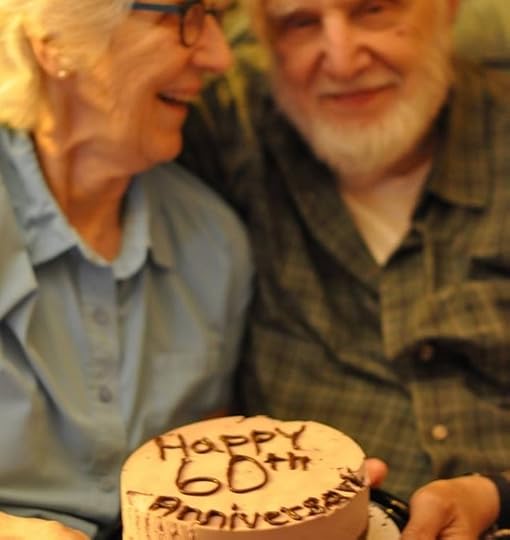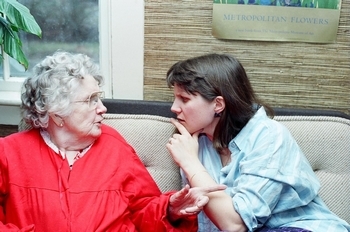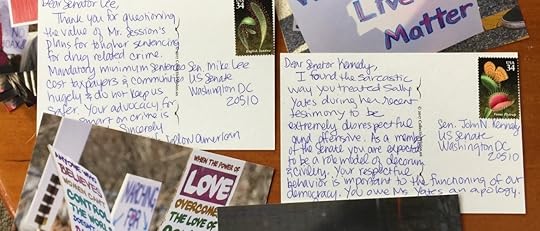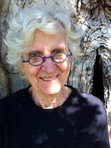Pat Schneider's Blog, page 2
May 3, 2018
A Celebration of an Important New Book – Writing Ourselves Whole
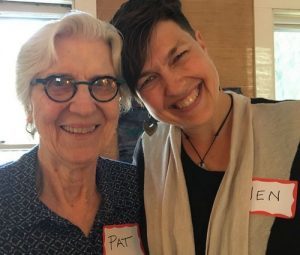 Twenty-two people is about a dozen more than fit really comfortably in our living room, but we were all happy to be there two weeks ago to help Jen Cross celebrate the publication of her quite wonderful book, Writing Ourselves Whole: Using the Power of Your Creativity to Recover and Heal from Sexual Trauma.
Twenty-two people is about a dozen more than fit really comfortably in our living room, but we were all happy to be there two weeks ago to help Jen Cross celebrate the publication of her quite wonderful book, Writing Ourselves Whole: Using the Power of Your Creativity to Recover and Heal from Sexual Trauma.
Jen had invited me to write the foreword to the book, which I did joyfully. It describes a developed and tested methodology for using the Amherst Writers & Artists workshop method as a healing practice for survivors of sexual abuse.
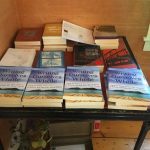 For that foreword, please click here.
For that foreword, please click here.
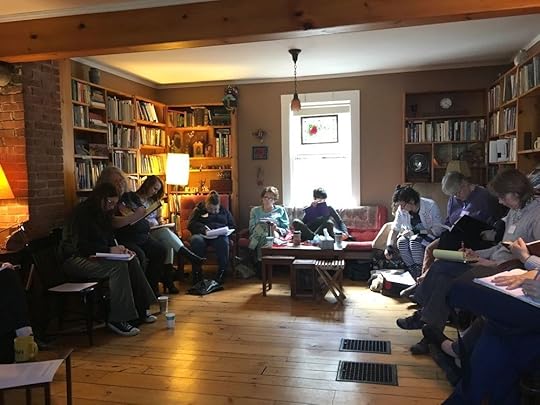
March 19, 2018
Writing Ourselves Whole – celebrating Jen Cross’ new book
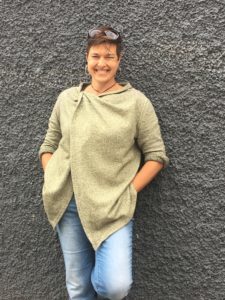 Jen Cross, an AWA-certified Affiliate, has been doing break-through work in California, using the AWA method to liberate and empower persons who have suffered sexual trauma, and to give voice also to healthy, joyous sexual experience.
Jen Cross, an AWA-certified Affiliate, has been doing break-through work in California, using the AWA method to liberate and empower persons who have suffered sexual trauma, and to give voice also to healthy, joyous sexual experience.
I have been in awe of her work for years. Recently I was greatly honored to be asked to write a Foreword for her new book, which I was happy to do, because Writing Ourselves Whole is simply wonderful. (This foreword is included at the bottom of this post, if you’d like to read more.)
You are invited to join Jen Cross and I in Amherst to celebrate the release of Writing Ourselves Whole: Using the Power of Your Own Creativity to Recover and Heal from Sexual Trauma (Mango, 2017).
The afternoon will include a reading, book signing, an opportunity to write in community, and a time for Q&A.
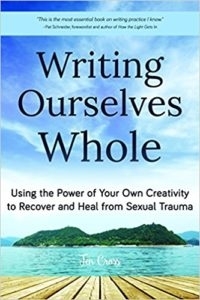
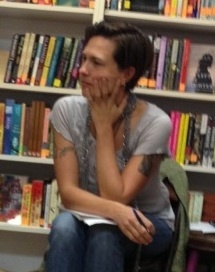
Saturday, April 7,
2pm – 5pm
The Schneider home
77 McClellan Street
Amherst, MA 01002
(There is no fee, but a Donation to Amherst Writers & Artists is requested.)
Places are very limited – if you plan to come you must RSVP to ensure there will be a spot for you; please email your intention to attend right away to: pat@patschneider.com
I’m delighted to be able to support Jen in this way as she launches this important project.
___________________________________
WRITING OURSELVES WHOLE:
Using the Power of Your Own Creativity
to Recover and Heal From Sexual Trauma,
by Jennifer Cross
(Mango Publishing Group, 2017)
FOREWORD by Pat Schneider
Writing Ourselves Whole is the most essential book on writing practice I know. It goes at great depth and length into territory that other books, including my own, have treated as important but not as fully developed methodologies. Those of us who have written about writing, and have included writing as a healing practice, have been waiting for this book. Jen Cross is the perfect author to have created it. Although the central focus here grows out of her own profound experience of sexual abuse, there is little in her content that does not apply to other kinds of trauma. She expands upon the definition of trauma in the Diagnostic and Statistical Manual of Mental Disorders (“exposure to actual or threatened death, serious injury or sexual violence.”) She writes: “Trauma is a site of shock in the body and/or psyche. It’s a rupture, a bifurcation, a disassembly. Trauma marks the moment when what was ended, and something new emerged.” Then she asks, “But what was the moment of trauma?”
This book is about the search for and the uncovering of, that moment: its actuality; its lingering images; its effects in the life of the person who experienced it; and a proven healing methodology: writing. Every writing teacher, writing coach, writing workshop or group leader — and every person with a history of any kind of trauma needs this book. The teachers and guides need it because in every group, class or workshop they lead there will be trauma survivors. Survivors need it because it is a methodology that can be used, as Cross makes clear, alone or in tandem with therapy, counseling, and/or medical interventions.
She suggests that almost everyone has suffered some trauma. We may take trauma into our bodies and lives through our parents’ physical violence, or sexual misuse or molestation, through their name calling or threats or mind games or psychological torture. It may be an assault by a stranger, someone who took us by surprise on the street or in our home. It may be a natural disaster, like living through an earthquake or hurricane. It may be a physical illness, like cancer. It may be living under racism, and/or other forms of oppression. It may be living or fighting in a warzone. It may be the legacy of our parents’ or grandparents’ traumas, or ancestors’ experiences of political, cultural, or intimate violences.
I have had in my workshops, and now in my deeply personal friendship, a man who was a survivor of trauma during his youthful years as a medic in the Vietnam war. Our first contact was when he called me to ask if he could join my writing workshop. The leader of the workshop he had been attending asked him not to come any more, because the other members of the workshop “could not take” what he was writing about.
That silencing, and that silence, is at the heart of Jen Cross’ book. She brilliantly and explicitly makes clear the mechanisms of silencing at work in sexual predation, as the predator threatens his or her prey in order to protect the predator. But she never forgets the silencing that goes on in relation to other kinds of trauma – the reluctance to hear the almost unbearable truths of human cruelty, human suffering.
Yet deeper even than that silencing is the silence of the self, the inability to remember, the unwillingness to revisit old trauma, the fear of what might happen to self or to others if voice was give to old wounds, old pain. Writing alone and/or in a supportive group of peers, Cross makes clear, can be a safe way to open images that had been locked in inner and/or outer silence.
She gives careful attention to the fears of writing that plague most people who try to put pencil to paper, fears that inhibit and often fully prevent artistic creation. In her sections of journal for her own healing, and in her suggestions, prompts, and helps for her readers, she stresses the crucial importance of what Peter Elbow termed “free writing.” To write is to enter the mess, is to spill out all your syllables, is to devil the precious eggs everyone else treads so carefully upon. Writing opens the wound, lets in oxygen and releases pus, helps me breathe again, I mean, breathe with gills & webbed toes, breathe against the tide that’s coming in, breathe through the mountains of fear I live within. . . . . This is what writing does. It marks up what we work so hard to make smooth, it pulls tight all the lines cast forth within us, knots together past present future, opens space and time to release the brilliant catastrophe we were meant to be. . . . writing sets all that possibility free, helps it step ginger or fierce into the world, to discover ourselves again.
Writing Ourselves Whole is a book of many treasures: that lyrical beauty of language; a practical, measured trove of specific helps both for an individual seeker and for a person wanting to create a supportive group for trauma survivors like the ones Cross so clearly describes; and somewhat unexpectedly, pages of what Cross calls “delicious body stories” – accounts of workshops dedicated to erotic writing. Through all of this quietly, rather subtly, Cross’ own story emerges from the beginnings of the abuse she suffered until the dramatic end of it and through her own recovery of self through her writing practice. Sprinkled throughout and condensed near the book’s end are writing prompts and suggestions for confronting, understanding, and surviving the various stages of recovery.
I deliberately stress the word “survive” in relation to the stages of recovery. For me, personally, the greatest “Ah-HA!” of the book came in the section where Cross, walking on a beach alone at night, deals with the possibility that she, herself, is not broken, as she has defined herself throughout her healing practice. “Not broken or unbroken: rather, intact and imperfect. Wounded, sore, struggling, scared, funny, hopeful.” There, at that point in the reading of her book manuscript, I felt myself thinking, I need to write. I need to write how it might feel if I imagine myself not broken where I was hurt, where I have no memory, but lingering effect of something bad happening. I need to write. I would be surprised to learn that anyone could read though this book and not be stopped, surprised, and finding him or herself thinking: I need to write.
Nowhere does Cross imply or state that recovery through writing will be easy. But the essential initial act of courage, she makes very clear, is to break silence. And the first effective step toward recovery may in fact be breaking one’s own inner silence, privately by writing, or openly by writing and reading aloud in a supportive group.
No writer before Jen Cross, I believe, has made that fact so irrefutably clear. And no writer before her has translated their own deep experience of trauma and recovery more passionately, more beautifully, more richly with quotations from other writers, medical professionals, philosophers, and poets.
Writing Ourselves Whole is cause for celebration. Its time has come. It will be an invaluable training and tool for both professionals dealing with trauma survivors, and for survivors looking for a private and/or beginning open revelation of their own stories.
January 15, 2018
Two Lovely Things Happening TODAY – January 15, 2018
Today two very nice things are happening for me and my poetry!
The first is that an interview of me by Daisy Mathias and reading of my poems is being broadcast at 5 p.m.on WMUA, 91.1 FM., the radio station of UMass. 
For eleven years, Daisy Mathias has produced a weekly radio program on WMUA-Amherst, 91.1 FM, the student and community radio station of UMass-Amherst. Poetry à la Carte features poems both ancient and modern, commentary, and interviews with local poets. The program is streamed live at www.wmua.org, Mondays, 5 pm EST.
In her spare time, Daisy consults as a pediatric speech-language pathologist at Shriners Hospital, Springfield, MA.
____________________________
And the second is that a poem of mine is being featured on Ted Kooser’s American Life in Poetry.
Newspapers carrying the column download it as a PDF and run it on their usual print schedules.
People in 71 countries now receive the column in Nepal, Indonesia, Uganda, Bangladesh, Egypt, Tunisia, Australia, New Zealand, Peru, most of Europe, Mexico, India, The Philippines, Turkey, China, Viet Nam, South Korea, Canada, Myanmar, Argentina, Tarawa Atoll, the U.K., and U.S. Readers from Maine to Hawaii. It’s amazing to think of people in all these places reading the work of contemporary American poets each Monday.
Current readership is about 3,500,000 per week. Subscribers receive it electronically.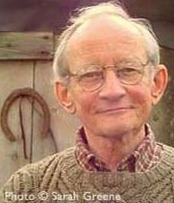
====================
Additional info:
December 22, 2017
PEACE, LIKE A RIVER
My mother telling stories on her last Christmas day
Yesterday I received a card from my daughter, Bethany, that was beautiful. On the cover, the words: When Peace, Like a River.A rush of memories came, as she knew they would. My mother, whom I have finally written myself into forgiving and loving truly with all my heart, had a hard, hard life. And countless times I heard her singing to herself an old hymn, When peace like a river, attendeth my way . . .
Her father was a southern Missouri fundamentalist Christian who walked the floor at night struggling with what he perceived (rightly) were contradictions in the Bible — which to him meant the whole thing was worthless. He gave it up, embraced Darwin, and told my mother as a young girl, “I’d rather see you in your grave than baptized.” When she was an early teenager, she put Sunday clothes in a paper bag, changed into them behind bushes alongside the country road, walked to a Methodist camp meeting and got herself secretly baptized. Then in her late teens she joined a deep-down fundamentalist sect called “Mount Zion Holiness community.” Women there never cut their hair, wore their skirts to their boot tops, their sleeves to their wrists – almost unimaginable in those hot, southern summers. Their belief was that there are “two works of grace — salvation sand anctification.”
After sanctification, it was impossible for believers to sin.
My mother, Lelah Ridgway Vought, in earnest discussion with our theologian daughter, Laurel Schneider
Then she married my father, had two kids, and four years later divorced him for his drinking and whoring. (Another telling, for another time: he, too, has his story.)She returned to the holiness community, rented a farmhouse on their land, across a two-track dirt road from their tabernacle. They considered her a fallen sinner for divorcing; they loved her and set themselves to trying to redeem her. She told me they were “the little, stingin’ kind,” and to stay away from them. But on summer evenings she sat on the porch during camp meetings in the tabernacle, and sang along as they sang hymns in four-part harmony – the music that Garrison Keillor has called the most sensual music in the world. Only once, in her entire life, did she ever again go to a church.
Granddaughter Sarah’s first violin
But she had a favorite hymn. Only the first verse, as the others are full of the theology she had fled. The words she sang are remarkable, given her story. It was written by Isaac Watts, who wrote some 600 hymns, among which is “Joy to the World.”The card from Bethany brought my mother so strongly back to my mind and heart, I looked for a recording of the song, and was surprised not to find only one poor one in English, but a good number, both sung in Korean and instrumental. (Inserted at the end of this post). I chose a beautiful instrumental recording: When Peace, Like a River, Taiwan Gospel Book Room, Hymns of Praise 6.
Here are the words:
***
When peace, like a river, attendeth my way,
When sorrows, like sea billows roll,
Whatever my lot, Thou hast taught me to say,
It is well, it is well, with my soul.
It is well, with my soul,
It is well, it is well, with my soul!
***
Bless your heart. Whatever your tradition, may you be able to find joy in it, or in the memory of it, in this holy season. May it be well with your soul. May you be blessed with music and with peace, like a river.
November 6, 2017
Write to Protest & to Thank!
I have very seldom expressed myself on social media about political matters, but I am so pleased with this discovery I want to share it.
Jennifer Hofmann has created a site that I love, because it gives me something even more important than signing petitions about bad and scary things. I have done what she suggests — I have purchased a pile of postcards and postcard stamps. She gives me exact mailing addresses, and she lists not only the terrible things I want to protest — even more importantly, I think, she tells me who to thank! I have written postcards to Senate and House members who think entirely differently than I, but who have done something or said something good for our nation, good for our souls. I’ve sent cards to major figures in Germany and France as well, thanking them for some good act. It makes me feel so good. If you want to try it, go to her website: Americansofconscience.com.
October 27, 2017
YOUR BOAT, YOUR WORDS
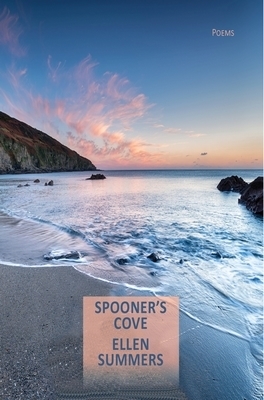
It was a wonderful celebration, and it put me in mind of what miracles can happen when a small group of friends work together. This weekend Amherst Writers & Artists Press released our thirty-eighth and thirty-ninth books of poetry by poets who have come into their own voices over many years of participation in AWA workshops, trainings, and in leading their own workshops. Ellen Summers’ chapbook, Spooner’s Cove, is celebration of the ways of water, in the human body as well as on the face of the earth. Poet Patricia Lee Lewis calls them a “gorgeous collection of sea-spangled, archetypal poems. The Glass Train, by Annie Fahy, is a full book. Sue Walker, Poet Laureate of Alabama, 2003-2012, wrote about it, “The poems . . . are delicate, beautiful, clear as crystal but also momentary shards of glass that cut when they deal with trauma.”
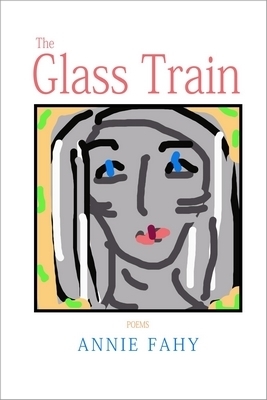 What a bright, refreshing difference it is to work intimately with a group of friends who take craft utterly seriously, but understand that we grow as writers just as we grow as human persons – in an atmosphere of encouragement, experimentation, careful and constant learning, and belief in our own dream.
What a bright, refreshing difference it is to work intimately with a group of friends who take craft utterly seriously, but understand that we grow as writers just as we grow as human persons – in an atmosphere of encouragement, experimentation, careful and constant learning, and belief in our own dream.
Years ago, when I was beginning to lead creative writing workshops, and without knowing it, building a workshop method that enabled, rather than disabled, writers, a poet whose work looked like no one else’s – brilliant, daring, her own unique voice, Sue Darling, sent new poems to her former professor of writing. He wrote back, “Your poems lack discipline.” I wrote a poem in a heat of anger. After all these years, listening to these two newly published authors, the poem came back to mind:
YOUR BOAT, YOUR WORDS
Your boat, they will tell you,
cannot leave the harbor
without discipline.
But they will neglect to mention
that discipline has a vanishing point,
an invisible horizon where belief takes over.
They will not whisper to you the secret
that they themselves have not fully understood: that
belief is the only wind with breath enough
to take you past the deadly calms, the stopped motion
toward that place you have imagined,
the existence of which you cannot prove
except by going there.
~ Pat Schneider
October 13, 2017
PLEASE JOIN ME
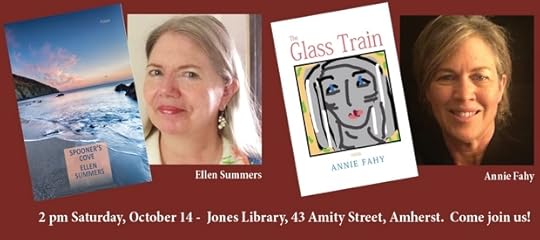
I will be reading from my new, forthcoming book of poems on Saturday, October 14th in Amherst, and celebrating two new books from Amherst Writers & Artists Press by North Carolina AWA writers, Annie Fahy and Ellen Summers.
Two winners of the Pat Schneider Poetry Contest will also read their winning poems. Judge Sue Walker, Alabama Poet Laureate.
Time: 2 pm Saturday, October 14
Place: Jones Library, 43 Amity Street, Amherst.
Come join us!
September 20, 2017
A REQUEST FOR ONE OF YOUR POEMS
Most of you who are reading this newsletter have written one or more poems beginning with the words, “I am from . . .” because the poem from which those words come is included in my book Writing Alone and With Others and has been, since the book’s publication in 2003, the most powerful prompt I know to offer people who think they cannot write a poem.
George Ella’s poem begins:
I am from clothespins,
from Clorox and carbon-tetrachloride.
I am from the dirt under the back porch . . .”,.
One time when I wrote to this prompt, I began:
I am from oak leaf shadows on a tabernacle floor
where children played in sawdust
and grown-ups sang . . .”
Over many years I have sent to George Ella poems written in response to her lines. One was written by a teacher who was, herself, a refugee in a camp in Africa, where Catholic Sister Maire O’Donohoe had offered the poem as a prompt. Another was written in a women’s jail near my home, where Karen Buchinsky, using the AWA method, trains leaders of workshops for incarcerated women.
Now a project named “The I AM FROM project” is asking for poems written in response to that prompt. I hope that this notice might move AWA workshop leaders to contribute and also offer the opportunity to their writers. Here is a letter from George Ella Lyon, author of the poem, “Where I’m From”:
Dear Friends of Poetry & Democracy,
I’m writing to tell you about a project that Julie Landsman & I are developing in response to the rhetoric of xenophobia and isolationism that is becoming rampant in our country. In such an atmosphere, how can we find our voices and make them heard?
One avenue is through poetry, that heart-cry that comes to us in times of love and crisis. Because my poem, “Where I’m From” has been used widely as a writing model (most recently across Kentucky during my tenure as Poet Laureate)*, Julie–an educator, writer, and activist in Minneapolis–reached out to me with the idea of creating a national “I Am From” Project. Through Facebook**, a website, and a great network of teachers, librarians, writers, and community leaders, as well as other organizations, we hope to encourage and gather “I Am From” creations from all over the country and take them, in some form, to Washington in April of 2018.
The action in D.C. will be a culmination of local readings and workshops, statewide presentations, radio and TV appearances, etc., and we plan to present what we have gathered to the National Archives. We’re encouraging creation in many directions; poems, yes, but also dance, art, song, drama—expressions which can be videoed and shared with and beyond their local audience. In terms of poetry, one of Julie’s visions is a scroll made of “I Am From” poems wrapped around a school, a library, a state capitol. Another possibility is to put our poems on posters and have a river of poetry on the National Mall.
Our deepest hope is to open a way for We the People to express who this country really is, what our values are, and how they unite rather than divide us. America’s embrace is wide enough to include all of us if we put our minds and money to our common welfare.
We would love to have you involved in some way. Please send comments and suggestions to Julie at:
iamfromproject@gmail.com
or me at:
rubyjomountain@gmail.com
Here’s to equality and hope. Here’s to all our voices!
George Ella Lyon
Where I’m From Project Website
FB: I Am From Project
George Ella Lyon
Kentucky Poet Laureate 2015-2016
August 19, 2017
The Poetry of Presence
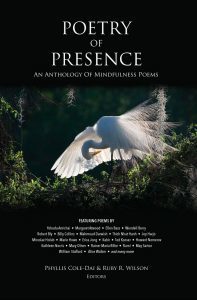
click to see the full cover larger
I am delighted to announce that I have two poems coming out in the upcoming publication The Poetry of Presence.
I know many of the readers of this blog and on my mailing list are facilitating workshops in the AWA method, so you may be particularly interested. Here’s part of the promotiong for the book: “a valuable resource for literature teachers, spiritual directors, meditators, interfaith clergy, mindfulness trainers, social workers, counselors, poetry therapists, hospice and grief workers, and medical personnel.”
I’m honoured to be in the company of these poets, and many others:
Yehuda Amichai • Margaret Atwood • Ellen Bass • Wendell Berry • Robert Bly • Billy Collins • Mahmoud Darwish • Thich Nhat Hanh • Joy Harjo • Tony Hoagland • Miroslav Holub • Marie Howe • Erica Jong • Kabir • Galway Kinnell • Ted Kooser • Howard Nemerov • Kathleen Norris • Mary Oliver • Rainer Maria Rilke • Rumi • May Sarton • William Stafford • David Wagoner • Alice Walker and many more. Click here to see the full list of poets.
Here’s a bit about the book from The Poetry of Presence website:
Mindfulness poems invite us to bring our whole self to whatever moment we’re in, and truly live it. They encourage us to be more present, more attentive and compassionate, in the living of our days. They grant us a taste of being good enough, just as we are, in this world, just as it is.
Poetry of Presence ($21.95; dimensions 6″ x 9″) is a collection of more than 150 mindfulness poems, mostly by contemporary or recent poets. These poems call us to the Here and Now, and help us to dwell there. The Here and Now is all that truly belongs to us, and as the poets say, it’s enough.
This is a book for the times we live in. An inspiring read for lovers of beautiful, accessible poetry, it’s also a valuable resource for literature teachers, spiritual directors, meditators, interfaith clergy, mindfulness trainers, social workers, counselors, poetry therapists, hospice and grief workers, and medical personnel.
Learn more about the connection between mindfulness and poetry, the background of the editors, and what people are saying about The Poetry of Presence.
And here is the book trailer:
60th Anniversary
August 17th was the 60th Anniversary of our wedding — August 17th, 1957. Here’s a new poem and some old and new pictures.
TO A HUSBAND
Today the Visiting Nurse Association
has pronounced me able to walk up
the flight of stairs to our double bed.
According to the computer,
I am today 29,908 days old.
Of those days, I have lived with you
21,430 days. We have slept together
more than twenty-one thousand nights.
I gripped the handrail with two hands
as the Visiting Nurse physical therapist
watched from the first floor and you
followed one step behind me
to catch me if I fell. When we were
half way up, she became as concerned
about you falling, as she was for me.
I did fall for you on a Saturday
58 years, 35 weeks and 1 day ago.
I stood at the back of the chapel
of our school out of sight waiting
in the dress my mother made, its
French lace and great satin scallops.
For a few minutes as the organ played
and Chester sang the song I had written,
I stood out of sight and alone.
I thought, Who is this guy? I don’t
even know him! Then I was directed
to the doorway and I saw you
at the end of that long center aisle
through our gathered beloved,
and you grinned at me, and I
thought, Oh, yeah – him.
And walked slowly to you
toward the rest of my life.
Today it has been 72 nights
since I fell again, taking a turn
from my standing computer desk
to my sit-down desk
by the window with the bird feeder.
For 72 nights I have slept in a hospital,
a rehab center, and finally
in a single bed under windows
in the room where I write.
You slept upstairs until
they brought me home
with my walker and my special tools
for doing things without bending
my hip more than 90 degrees.
27 nights we kissed good night
in the room where I write, and
you went to sleep on the couch.
Today, after we practiced walking
up the stairs to our bedroom,
you behind me, the therapist
watching – after she left,
you went to your clarinet
and played a sweet melody
by Mozart. Then I asked you
to play my favorite song,
Just a Closer Walk With Thee,
and when you took off with a wild
jazz riff, I cried, remembering
how — both of us virgins in that
long ago time — how you carried me
across the threshold in an old hotel
for our first night sleeping together,
twenty one thousand nights ago.
-Pat Schneider











